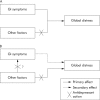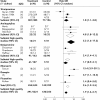Use of psychopharmacological agents for functional gastrointestinal disorders
- PMID: 16099800
- PMCID: PMC3260562
- DOI: 10.1136/gut.2004.048884
Use of psychopharmacological agents for functional gastrointestinal disorders
Figures



References
-
- Clouse RE. Esophageal spasm syndrome. Presented at the annual meeting of the American Gastroenterological Association, San Antonio, May 1990.
-
- Talley NJ. Antidepressants in IBS: are we deluding ourselves? Am J Gastroenterol 2004;99:921–3. - PubMed
-
- Whitehead WE, Levy RL, Von Korff M, et al. The usual medical care for irritable bowel syndrome. Aliment Pharmacol Ther 2004;20:1305–15. - PubMed
-
- Ringel Y, Sperber AD, Drossman DA. Irritable bowel syndrome. Annu Rev Med 2001;52:319–38. - PubMed
-
- Camilleri M, Heading RC, Thompson WG. Consensus report: clinical perspectives, mechanisms, diagnosis and management of irritable bowel syndrome. Aliment Pharmacol Ther 2002;16:1407–30. - PubMed
Publication types
MeSH terms
Substances
LinkOut - more resources
Full Text Sources
Medical
